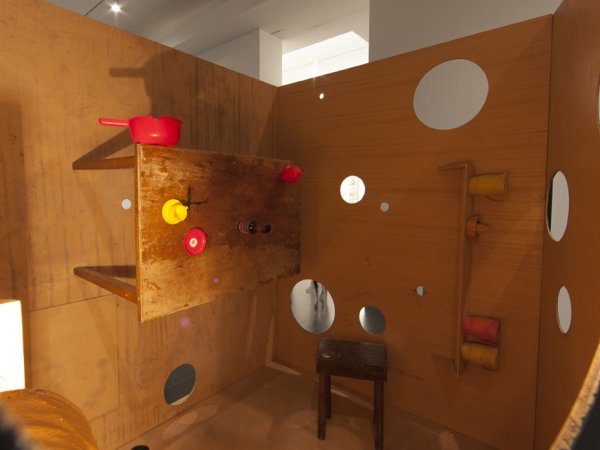Fissures Critical Episodes (1957-2011). MACBA Collection
Fragment, silence and disorder are part of how we construct ourselves as subjects. Artists such as Erick Beltrán, Anne-Lise Coste, Peter Friedl, Sílvia Gubern, Paul McCarthy, Matt Mullican, Raymond Pettibon and Oriol Vilapuig show some of the fundamental fissures in contemporary subjects. Through their work, they question the processes of learning and the inner social models.
Oriol Vilapuig accompanies one of his drawings with a quotation from Emile M. Cioran, the Romanian thinker who defends the idea of fissure and disorder as a possible form of conscience. Peter Friedl projects a similar idea in his video Dummy, 1997: a young man rebelling against the turnstiles in an underground station who does not formulate an articulate protest, rather the blind refusal of an excessively regimented world.
Drawing is a privileged medium for approaching fragment and provisionality, as seen in the series by Anne-Lise Coste, Peter Friedl and Sílvia Gubern. These are authors who give drawing a fundamental weight. The physical gesture contained in the act of drawing is directly linked to the first representations of the world. These artists’ works recover childhood as a troubled moment of formation. For Anne-Lise Coste drawing is associated to illness. In the winter of 2010, the artist sequestered herself for five days to evoke the five years of adolescence she spent in medical care. The result is a series of drawings of enclosed clinical spaces, as unproductive as childhood itself.
The idea of interval and pause is central to the work of Oriol Vilapuig. His figures evoke culture as a space of shared memory that humanises our experience, yet the empty stretches between one image and another are as important as the images themselves. As the author indicates, the processes of acculturation narrowly define the margins and silences that govern the construction of our image of the world.
Our senses enable us to obtain a variety of data on facts, but without criteria we would never be able to arrange them into a system or generalised image. Matt Mullican and Erick Beltrán investigate the so-called maps of knowledge. Mullican, in complex works such as M.I.T. Project, Untitled 1990–2009, investigates the logic of archives and compilations. Beltrán creates an almost encyclopaedic register of sentences by non-specialist people. ‘How do cells die?’ ‘How are wars started?’ Beginning with these basic questions, The World Explained, São Paulo, Barcelona, 2008–9 (I) gathers descriptions, diagrams and maps showing how our vision of the world is often based on prejudice.
A considerable part of art practice is centred around activating the processes of unlearning and rebellion. While it is true that childhood is structuring, it is equally true that it is constructed on forms of violence that are not always evident. Artists such as Paul McCarthy, Mike Kelley and Raymond Pettibon have created works that blow away all forms of acquired social conventions. Through drawings, installations and performances, they have developed an ironic and devastating critique of the incorporated models of life. Paul McCarthy, in his work Pinocchio House/Crooked Leg, 1994, constructs a house where adults behave as children, fairytale characters become real and objects invert their usefulness. It is a space of non-regimented subjectivities akin to that evoked by Federico Guzmán in his work Emboscadura [Ambush], 1994–95. Using a large blackboard, the artist invites the public to draw freely and leave improvised messages.
























































